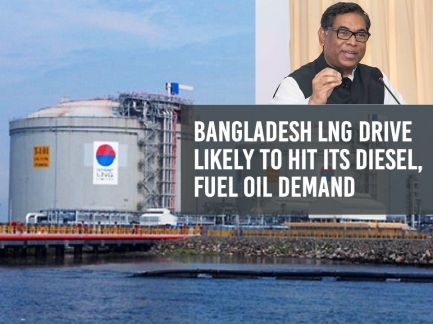|
Bangladesh's plan to start importing liquefied natural gas (LNG) next year will likely dampen its demand for oil used in power generation, government and industry sources said.
|

|
|---|---|
|
The South Asian nation typically ships in around 2.5 million tonnes of fuel oil and 3.2 million tonnes of diesel annually, making it one of the top 10 such importers in the region. But its push towards cleaner gas is likely to displace some of that appetite for oil, with the country's first floating LNG import terminal due to begin accepting cargoes in May next year. "LNG is considered to be an environmentally friendly source of energy and its cost is cheaper than fuel oil," said Nasrul Hamid, Bangladesh junior energy minister. He added that the country would gradually shift to greener, cheaper sources of energy for electricity generation and in industry. State-run Petrobangla has signed preliminary deals for two more LNG terminals and a memorandum of understanding with Swiss commodity merchant AOT Energy for help lining up supplies. It has also said that it is in talks with top LNG producer Qatar. Of the total 13.3 gigawatts of installed electricity capacity in Bangladesh, about 63 percent is from gas-fired plants, 22 percent from plants powered by fuel oil and 8 percent from diesel, said Senthil Kumaran, senior oil analyst at energy consultancy FGE. That translates to consumption of 12,000 to 14,000 barrels-per-day (bpd) of high sulphur fuel oil for power generation and 10,000 to 12,000 bpd of diesel, he added. While it was not clear how much of the country's import demand for oil products would be displaced by LNG, it would probably start to happen in 2019, said FGE and an official with state-owned Bangladesh Petroleum Corp. "At the end of this year, we will get a full picture of our imports of oil products for the next year," said the official, who declined to be identified as he was not authorised to speak with media. LNG is currently about 15 to 20 percent cheaper than fuel oil, said Kazi Mohammad Anwarul Azim, manager of Petrobangla's LNG unit. Bangladesh's imports of LNG are expected to reach 5 million tonnes in 2020, said FGE's Kumaran. Still, with not many dual-feed power plants in the country and new oil-fired power plants installed over the last few years, Bangladesh will continue to import fuel oil to run those plants, he said. By Reuters l Reporting by Jessica Jaganathan in Singapore and Ruma Paul in Dhaka l Additional reporting by Mark Tay in Singapore l Editing by Joseph Radford |
|
Home >> Career Resource >> FAQ
Bangladesh LNG Drive Likely To Hit Its Diesel, Fuel Oil Demand
Related Career Resource
By : Reuters l Nidhi Verma, Scott DiSavino & Oleg Vukmanovic l Additional reporting by Mark Tay in Singapore l Editing by Henning Gloystein and Raju Gopalakrishnan | July 03, 2017
By : Reuters l Reporting by Henning Gloystein l Additional reporting by Keith Wallis l Editing by Tom Hogue | June 27, 2017
By : Reuter l Reporting by Patpicha Tanakasempipat l Editing by Tom Hogue | June 23, 2017
By : Reporting by Liz Lee l Editing by Amrutha Gayathri | June 22, 2017








